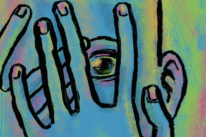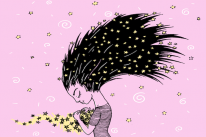
“True belonging only happens when we present our authentic, imperfect selves to the world. Our sense of belonging can never be greater than our level of self-acceptance.” ~Brené Brown
Last year over lunch, my friend, Jess, confessed something to me that hit me right in my gut because I’d been there too—that exact same lie, that exact same fear.
Out of nowhere, she blurted out, “I need to cancel.”
“Cancel what?” I asked.
She burst into tears. “I RSVPed yes to Jen’s wedding months ago, but it’s this weekend, and I just… I can’t do it.”
As she sobbed, she confessed she’d already crafted a text message claiming food poisoning. The wedding was for her best friend since college, and she was bailing—not because of an emergency, but because she was terrified of being judged by the other guests.
My stomach dropped. Not because I was shocked, but because I saw myself in her confession.
Back in 2012, I’d done exactly the same thing. My cousin, who I’d grown up with—shared a bedroom with during family vacations, passed notes with during boring family dinners—was getting married. And I…just couldn’t make myself go.
I still get a sick feeling remembering it. Me, twenty-nine years old, sitting fully dressed on my bed at 3:42 p.m., staring at the invitation that had been on my fridge for months. The wedding started at 4:30. It was a twenty-five-minute drive. And I was frozen, literally nauseous with anxiety.
What if the small talk was unbearable? What if my ex was there with his new girlfriend? What if people noticed I’d put on weight since Christmas? What if, what if, what if…
I texted my cousin claiming a 102-degree fever. Then I ordered pizza, watched Netflix, and tried to ignore the hollow feeling in my chest.
Yeah. Easier to stay home where it felt “safe.”
The Painful Paradox
Working through my own social anxiety mess, plus helping others with the same struggle over the years, has taught me something that blew my mind when I first realized it:
We reject ourselves BEFORE anyone else gets the chance.
Let me explain.
We think our social anxiety comes from being afraid of other people’s judgment. But that’s not quite it. We’re actually afraid they’ll confirm the crappy things we already think about ourselves.
When I bailed on that wedding, I wasn’t really worried about what my family would think. I was worried they’d see the “truth” I already believed: that I wasn’t interesting enough, put-together enough, or worthy enough to belong there.
So instead of risking that pain, I chose a different pain—isolation. I projected my own harsh self-judgment onto everyone else, assuming they’d see me the same way.
Talk about a messed-up strategy! By “protecting” myself from potential rejection, I guaranteed rejection by rejecting myself first. And worse, I created real-world “evidence” that I didn’t belong, which only fed my insecurities.
My friend was caught in the same trap. She didn’t actually know she’d be judged at the wedding. But she was so convinced of her own unworthiness that she assumed everyone else would see it too.
The Lightbulb Moment That Changed Everything
For most of my life, I brushed off my social anxiety as “just being an introvert.” Convenient label, right? Helped me avoid admitting I was actually terrified.
Then my friend Kayla—who has zero filter—called me out over coffee.
“Sandy,” she said, eyeing me over her mug, “you realize you spend like 90% of your energy imagining what people think about you and maybe 10% actually finding out?”
I almost choked on my latte. Ouch.
That night, I grabbed an old journal and started tracking my thoughts before social events. Holy crap. I was spending HOURS in mental gymnastics:
- Rehearsing conversations that might never happen
- Coming up with witty responses to imagined criticisms
- Planning defenses to judgments nobody had actually made
- Obsessing over outfit choices to avoid potential comments
I’d exhausted myself before even leaving the house! And the worst part? I was playing both roles in these imaginary scenarios—both the harsh judge AND the person being judged.
Talk about a rigged game.
So I decided to try something radical. My neighbor was having a dinner party that weekend. Instead of my usual mental prep work, I made myself a promise: just show up as-is. Not as the “entertaining Sandy” or the “impressive Sandy” or any other version. Just… me.
I won’t lie—I almost bailed three times that day. But I went. And without all the usual self-judgment noise in my head, something weird happened. I actually listened when people talked instead of planning my next clever comment. Conversations felt easier. I laughed more.
Afterward, my neighbor texted, “Thanks for coming! Loved our talk about your trip to Maine—we should grab coffee sometime.”
Wait, what? I hadn’t rehearsed the Maine story. That was just me rambling about something I loved. And she… liked it?
This tiny experience punched a hole in my belief system. Maybe, just maybe, people could like the actual me—not some carefully curated version I thought I needed to be.
Getting to Know the Real You
So here’s what I’ve figured out: the way through social anxiety isn’t becoming better at small talk or forcing yourself into uncomfortable situations. It’s about getting to know yourself—the real you under all that fear and protective armor.
When you actually know and like yourself, other people’s opinions just don’t matter as much. You develop a kind of internal anchor that keeps you steady even when social waters get choppy.
This journey toward knowing yourself isn’t always Instagram-worthy. It’s messy. But here’s what’s worked for me.
1. Catch yourself in self-rejection mode.
Start noticing when you back out of things because you’re afraid of judgment. Ask yourself, “Am I rejecting myself before even giving others a chance to accept me?”
Last month, I almost skipped a reunion with friends from high school because “no one would remember me anyway.” Classic self-rejection! Naming it helped me pause and reconsider.
2. Question your core beliefs.
Where did you get the idea that you’re not enough? Most of us are carrying around beliefs we formed as awkward thirteen-year-olds! Some of mine were:
- “I’m boring unless I’m entertaining people.”
- “People only like me when I help them with something.”
- “If I show my real feelings, people will think I’m too much.”
Once you identify these beliefs, you can start collecting evidence that challenges them. My friend who missed the wedding realized her core belief was “I don’t belong in celebrations.” We traced it back to an eighth-grade birthday party disaster!
3. Talk to yourself like you’re not a jerk.
I used to have a running commentary in my head that I would NEVER say to another human being. “You’re so awkward. Why did you say that? Everyone’s just tolerating you.”
Learning to speak to myself with basic decency was life-changing. When I feel anxious now, I’ll literally put my hand on my heart and say, “This is hard. Lots of people feel this way. How can I support myself right now?”
Cheesy? Maybe. But it works.
4. Baby steps, not cliff jumps.
Recovery doesn’t mean immediately diving into your scariest social situation. That’s like trying to run a marathon when you’ve never jogged around the block.
Start small. Maybe it’s:
- Coffee with one friend instead of a group
- A thirty-minute appearance at a party with permission to leave
- A class where the focus isn’t on socializing but on a shared interest
Each small win builds evidence against your “I don’t belong” belief system.
5. Create a self-connection practice.
You need regular check-ins with yourself to quiet the noise of imagined expectations and reconnect with who you really are.
For me, it’s morning journaling with coffee before anyone else is awake. For my friend, it’s painting terrible watercolors that no one will ever see. Find what helps you hear your own voice clearly.
Even four minutes of intentional self-connection can begin rebuilding your relationship with yourself. (Trust me, I’ve timed it!)
My Cousin’s Do-Over
Life can be weirdly generous sometimes. Three years after I missed my cousin’s first wedding, she got remarried (to the same guy—they’d eloped after family drama with the first ceremony, then decided to have a proper celebration later).
When the invitation arrived, my palms instantly got sweaty. Here was my chance to do things differently, but the old fear came roaring back.
This time though, I had new tools. Instead of spiraling into “what-ifs,” I asked myself, “What if I just showed up as myself? What’s the worst that could happen? What’s the best?”
I felt the fear—it didn’t magically disappear—but I didn’t let it make my decision. I focused on how much I loved my cousin and how I’d regretted missing her first celebration.
Was the wedding perfect? Nope. I spilled red wine on my dress within the first hour. I got stuck in an awkward conversation about politics with my uncle. I still felt twinges of “I don’t belong here” at times.
But I stayed. I danced badly to the Cha-Cha Slide. I ate cake.
And at one point, my cousin grabbed my hands and said, “I’m so glad you made it this time, Sandy.” The genuine joy in her eyes hit me harder than any anxiety ever could.
Sometimes showing up is enough.
The Gift of Just Being You
For most of my life, I thought social anxiety was just “how I was wired”—some unchangeable part of my personality. But turns out, it wasn’t about who I am. It was about how I’d learned to treat myself.
When I began treating myself with a fraction of the kindness I’d show to a friend, things shifted. Not overnight. Not perfectly. But genuinely.
The less I needed external validation, the more comfortable I became in my own skin. And weirdly, the more authentic connections I started making.
Look, I still get nervous before big social events. I still sometimes catch myself falling into the old mental prep work. But now I can laugh at it and gently redirect.
If you’re someone who tends to hide rather than show up, please hear this:
- The judgment you’re so afraid of is often coming from YOU first.
- By rejecting yourself, you deny others the chance to know the real you (and trust me, the real you is actually pretty great).
- The more you practice showing up authentically, the easier it gets.
Your presence—your real, unfiltered, sometimes-awkward presence—is worth sharing. Don’t let your harsh inner critic rob the world of your unique perspective and energy.
Maybe the greatest plot twist in this whole story is this: When I stopped trying so hard to be someone I thought others would accept and started accepting myself instead, I finally found the belonging I’d been searching for all along.
Funny how that works.
About Sandy Woznicki
Sandy Woznicki is a stress coach helping parents find their inner calm and get to know, like, and trust themselves (so they can be the person, parent, and partner they are meant to be). Learn how to speak to yourself like someone you love with this free inner voice makeover workbook.












 Though I run this site, it is not mine. It's ours. It's not about me. It's about us. Your stories and your wisdom are just as meaningful as mine.
Though I run this site, it is not mine. It's ours. It's not about me. It's about us. Your stories and your wisdom are just as meaningful as mine.